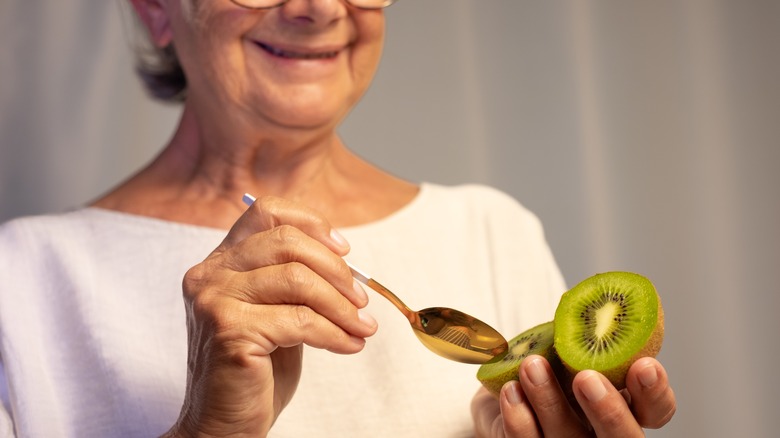Eating Kiwi Has An Unexpected Effect On Your Sleep
Sweet, juicy, and a wee bit tangy, there's one underrated fruit that may improve nearly every aspect of our sleep. Potentially replacing that warm glass of milk or your nightly cup of chamomile tea, enter the kiwi. Just one of these hydrating fruits contains more than 2 grams of fiber, 215 milligrams (mg) of potassium, 64 mg of vitamin C, and 23.5 mg of both phosphorus and calcium, among other essential vitamins and nutrients, reports the U.S. Department of Agriculture (USDA). Some of these nutrients may have us falling asleep faster, staying asleep longer, and achieving a better quality of sleep, according to the findings of a 2023 study published in Nutrients.
The general consensus is that adults want to be getting between seven and nine hours of sleep each night, which reduces the risk for various health conditions. Yet many Americans are lacking adequate sleep on a regular basis, with approximately 50 to 70 million people in the U.S. reported to have ongoing sleep disorders (via National Council on Aging). Eating kiwifruit, however, may be particularly beneficial for people who experience sleep disturbances.
Kiwi's serotonin and antioxidant properties may enhance sleep
In a 2011 study published in the Asia Pacific Journal of Clinical Nutrition, researchers recruited 24 participants to analyze how kiwi consumption impacted sleep. One hour before going to bed, participants ate two kiwifruits nightly over the course of four weeks. By the end of the study, the researchers saw reductions in the time it took participants to fall asleep. Boosts in sleep duration and sleep efficiency were also reported. Although more study is needed, the researchers cited kiwifruit's antioxidant and serotonin content as potential contributing factors in the fruit's sleep-enhancing effects, which they noted may be particularly helpful for individuals struggling with sleep disorders.
In a 2024 research paper published in the Journal of Pharmacology and Pharmacotherapeutics, experts note how antioxidants may enhance sleep quality by protecting against harmful free radical damage, which can otherwise wreak havoc on our sleep patterns. When it comes to serotonin, experts from a 2019 animal study published in Neuron found that a lack of serotonin was correlated with decreases in sleep pressure, one of two components necessary for sleep, with the other being an aligned circadian rhythm.
Kiwi contains sleep-promoting melatonin
Similar to the 2011 study, researchers from the previously mentioned 2023 study published in Nutrients had participants consume two medium-sized kiwifruits 60 minutes before bed for a duration of four weeks. This time, however, the participants were elite athletes. The research findings showed a relationship between eating kiwifruit and increases in sleep quality, total sleep time, and sleep efficiency. The athletes also woke up less often during the course of the night. And as any of us can probably attest, attempting to fall back asleep after waking up in the middle of the night is its own kind of nightmare. In addition, participants experienced drops in general stress levels and sport stress levels. The study team concluded that eating kiwi may have benefits to offer athletes in regards to sleep and recovery. One potential cause for this relationship may be the fruit's melatonin content — a natural compound that helps regulate our sleep-wake cycle.
Although kiwi is generally considered safe for consumption through diet, it is not advised for people with allergies to certain foods, including avocado, fig, sesame seeds, wheat, and other fruits. Because kiwi may also slow blood clotting, people with bleeding disorders are advised to speak with their doctor. Pregnant individuals or people who are breast-feeding should not consume medicine containing kiwi as it cannot be confirmed that doing so is safe. But in addition to potentially improving sleep, there may be other unexpected positive side effects of eating kiwi, including an immune system boost and improved heart health.


